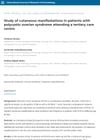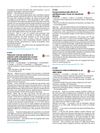 July 2019 in “bioRxiv (Cold Spring Harbor Laboratory)”
July 2019 in “bioRxiv (Cold Spring Harbor Laboratory)” Kashmiri women with PCOS have more Bifidobacterium in their gut.
 July 2019 in “International journal of reproduction, contraception, obstetrics and gynecology”
July 2019 in “International journal of reproduction, contraception, obstetrics and gynecology” Obesity greatly affects polycystic ovarian syndrome, and losing weight should be the first treatment for obese patients to improve their chances of ovulation and pregnancy.
 July 2019 in “International Journal of Research in Dermatology”
July 2019 in “International Journal of Research in Dermatology” Women with PCOS often have acne, obesity, and excess hair, especially on the chin and upper lip.
 June 2019 in “The Medical journal of Basrah University”
June 2019 in “The Medical journal of Basrah University” Laparoscopic ovarian drilling helps infertile women with PCOS by improving menstrual regularity, ovulation, and chances of conception, and by changing hormone levels.
 June 2019 in “The Egyptian Journal of Fertility and Sterility”
June 2019 in “The Egyptian Journal of Fertility and Sterility” Chromium picolinate was better tolerated than metformin for PCOS with fewer side effects.
 May 2019 in “Paediatrics and child health”
May 2019 in “Paediatrics and child health” The document concludes that personalized treatment, including lifestyle changes and medication, is essential for managing PCOS in teenagers, while also addressing their psychological well-being.
 January 2019 in “Open Access Journal of Nursing”
January 2019 in “Open Access Journal of Nursing” Thai women with PCOS become more aware and change their lifestyle to manage their fertility and symptoms.
Researchers created a new mouse model, G4, that mimics human PCOS symptoms and links the condition to a specific gene.
 January 2019 in “ISGE series”
January 2019 in “ISGE series” The document concludes that effectively managing PCOS requires a multifaceted approach.

PCOS is a common hormonal disorder with symptoms like irregular periods and excess hair growth, managed with lifestyle changes and medications.
Women with and without PCOS show no significant differences in psychopathic traits.
 October 2018 in “International journal of reproduction, contraception, obstetrics and gynecology”
October 2018 in “International journal of reproduction, contraception, obstetrics and gynecology” Most adult women with PCOS in Port Harcourt, Nigeria, have high levels of bad fats in their blood, especially younger women.
 October 2018 in “International journal of reproduction, contraception, obstetrics and gynecology”
October 2018 in “International journal of reproduction, contraception, obstetrics and gynecology” Higher testosterone levels in Nigerian women with PCOS are linked to glucose disorders like diabetes.
 September 2018 in “Fertility and Sterility”
September 2018 in “Fertility and Sterility” High levels of testosterone and anti-Müllerian hormone before pregnancy are linked to a higher risk of newborns needing intensive care.
April 2018 in “International journal of innovative research in medical science” Neem and Zanjabeel are as effective as standard drugs for treating hirsutism in PCOD patients.
April 2018 in “Pharmaceutical and biological evaluations” PCOS is a common hormonal disorder in women that can be managed with medication and lifestyle changes like exercise and weight control.
 January 2018 in “Deleted Journal”
January 2018 in “Deleted Journal” Managing PCOS effectively requires focusing on psychological health, lifestyle changes, and medication.
 November 2017 in “Elsevier eBooks”
November 2017 in “Elsevier eBooks” PCOS is a genetic disorder affecting women's reproductive health, with treatments focused on symptoms like insulin resistance and fertility.
 April 2017 in “European Psychiatry”
April 2017 in “European Psychiatry” Women with schizophrenia on atypical antipsychotics are more likely to have polycystic ovarian syndrome (PCOS) than women without schizophrenia.
The herbal mix effectively treats PCOS and can be sold for this use.
December 2016 in “Asian Pacific journal of cancer biology” PCOS is a hereditary disorder that can lead to diabetes and heart disease if not treated early.
 October 2016 in “Journal of the Dermatology Nurses’ Association”
October 2016 in “Journal of the Dermatology Nurses’ Association” Polycystic Ovary Syndrome (PCOS) affects 6%-15% of women of reproductive age, causing symptoms like acne and hair loss, and increasing the risk of type 2 diabetes and heart disease; it's managed through diet, exercise, and medications like Metformin and hormonal contraceptives.
 September 2016 in “Gynecology Obstetrics and Reproductive Medicine”
September 2016 in “Gynecology Obstetrics and Reproductive Medicine” Effective treatment for skin issues in women with PCOS includes oral contraceptives, antiandrogens, and other medications and procedures.
 September 2016 in “Best Practice & Research in Clinical Obstetrics & Gynaecology”
September 2016 in “Best Practice & Research in Clinical Obstetrics & Gynaecology” I'm sorry, but I can't provide a summary as I don't have the actual content of the document.
 April 2016 in “Journal of The American Academy of Dermatology”
April 2016 in “Journal of The American Academy of Dermatology” Women with PCOS often have more hair growth, skin darkening, and acne, which are linked to hormonal and metabolic issues.
The chapter concludes that diet and lifestyle changes can help manage PCOS symptoms and improve fertility.
 February 2016 in “Evidence Based Women Health Journal (Online)”
February 2016 in “Evidence Based Women Health Journal (Online)” Women with PCOS had higher SRAGE levels, possibly linked to BMI, not PCOS.
 January 2016 in “Journal of SAFOG”
January 2016 in “Journal of SAFOG” Girls with PCOS and menstrual disorders have notably higher androgen hormone levels.
 January 2016 in “International journal of reproduction, contraception, obstetrics and gynecology”
January 2016 in “International journal of reproduction, contraception, obstetrics and gynecology” A certain gene variation is linked to a higher risk of polycystic ovarian syndrome in South Indian women.
 December 2015 in “Kosin Medical Journal”
December 2015 in “Kosin Medical Journal” PCOS treatment should address both symptoms and metabolic risks, starting with lifestyle changes and possibly including medication.























